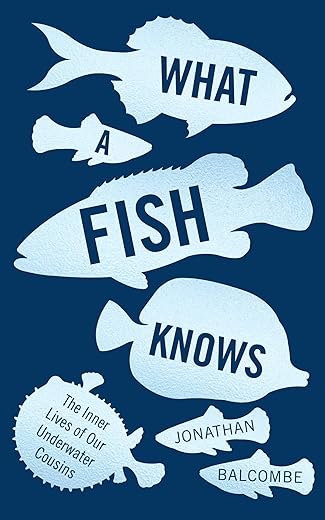What a Fish Knows: The Inner Lives of Our Underwater Cousins
£0.90
An Observer Book of the Year 2017
A Sunday Times must read
A New York Times Bestseller
Endorsed by His Holiness the Dalai Lama – ‘Balcombe vividly shows that fish have feelings and deserve consideration and protection like other sentient beings’
What’s the truth behind the old adage that goldfish have a three-second memory? Do fishes think? Can they recognize the humans who peer back at them from above the surface of the water? Myth-busting biologist and animal behaviour expert Jonathan Balcombe takes us under the sea, through streams and estuaries to the other side of the aquarium glass to answer these questions and more. He upends our assumptions, revealing that fish are far from the unfeeling, dead-eyed feeding machines so many of us assume them to be. They are, in fact, sentient, aware, social and even Machiavellian – in other words, rather like us.
What a Fish Knows draws on the latest science to present a fresh look at these remarkable creatures in all their breathtaking diversity and beauty. Teeming with insights and exciting discoveries, it offers a thoughtful appraisal of our relationships with fish and inspires us to take a more enlightened view of the planet’s increasingly imperilled marine life. What a Fish Knows will forever change how we see our aquatic cousins – the pet goldfish included.
Read more
Additional information
| Publisher | Oneworld Publications (1 Dec. 2016) |
|---|---|
| Language | English |
| File size | 4368 KB |
| Text-to-Speech | Enabled |
| Screen Reader | Supported |
| Enhanced typesetting | Enabled |
| X-Ray | Not Enabled |
| Word Wise | Enabled |
| Sticky notes | On Kindle Scribe |
| Print length | 306 pages |
| Page numbers source ISBN | 0374288216 |










by Lynx
Started off a little preachy, but quickly moved on to the science of fish intelligence. Really interesting, written for a lay audience and full of fun facts that you can share with your friends. A great read.
by birkytink
We are all guilty of thinking of fish in the plural, a picture of a slab or a net on a trawler coming to mind when the word is uttered. It is way past time for that to change, and our associated attitudes to change too. Fish are very much individuals, with internal lives and characters very much of their own. They are not the dead eyed machines that has been our perception for so long.
Balcombe sets out to gather all the most up to date information on the senses of fish, how fish feel, from stress to joy,their ability to plan and use tools and their ability to form social contracts. This all sounds somewhat fanciful but is backed up by very solid science and exceptional observation. Fish, it would seem, know an awful lot more than we credit them with, sentient , aware, capable of scheming and social. More like us than we would care to think.
238 engrossing pages, Balcombes writing style, and his layout of the mass of information gathered, makes for a comfortable read where it is easy to absorb complex concepts. A further 32 pages of notes / bibliography gives access to any further reading that may be of interest.
by suzimac
Loved this book. I wasn’t one of those who believed fish have a two second memory, but I was amazed at how bright they actually are! I learned so much about them, I am now looking at my two big goldfish in their (big) tank with new eyes and wondering what they think of us!
by D. Harley
Very comprehensive and well researched exposition on why many species of fish are really quite intelligent and sophisticated in behaviour, learning, tool use, young rearing etc. Full of surprises. A little bit preachy at the end, but none the worse for that.
by SJP
If you are a scuba diver, reading this wonderful book will add immeasurably to your enjoyment of every dive you do.
by Reviewer
I love the beautiful way the author talks about fishes. To hear somebody feel the same way as I do about fishes is rare. I have been lucky enough to be the guardian of betta fish and loved each one deeply. Many people are unable to understand this. I loved the stories about the bonds people have with their water pets. I found it really hard to read about the cruel scientific experiments that fishes had to endure. This book taught me a lot about the way fishes think and go about their lives. I think this is such an important book for any fish guardian.
by Fiona
Brilliant book and a must read for anyone with an interest in fish ans the ocean. Fascinating.
by Dr. Miles
One Amazon reviewer admitted that they hadn’t read beyond the opening section, and then said that this is not “an actual study on [sic] the intelligence, adaptability and versatility of different fish”. Well, if they’d read beyond the first few pages then they’d have seen that that’s exactly what this is! Except that that description doesn’t do justice to how incredibly entertaining the book is.
More amazingly still, one person claims that the material is “hardly groundbreaking”, thus proving that they, too, must have barely opened it. On virtually every page, Balcombe provides stunning, jaw-dropping facts which most of would never have believed possible. Reading this material is like being an alien who comes to planet Earth having previously always been told that mammals are incapable of complex thought or emotion, and who then, on arrival, gets their entire paradigm turned upside down. It’s quite literally the most fascinating book I’ve ever read.
So why just one star? Well, some of the readers/reviewers were so annoyed by the morality-related comments in the opening pages that they decided not to take the book seriously, and never even read the evidence which subsequently backed up the author’s initial assertions. One even claimed that the book is “anthropomorphic”, which is utterly untrue, as you’ll see if you actually read it. The problem is that this type of response could easily have been predicted, and therefore avoided, by the author. His accounts of the massive body of evidence regarding fish sentience and intelligence could not be more solid; so it is a great pity that he has not simply relied upon those stunning scientific sections to make the case for him, and then drawn ethical conclusions at the very end, instead of triggering the psychological defence mechanisms of so many readers before the facts had been presented. As it was, he missed a golden opportunity to open the minds of those whose minds are most in need of opening.
And for anyone who IS willing to read the book in a fair-minded way? I’m sure you’ll enjoy it as much as I did. It’s incredible.